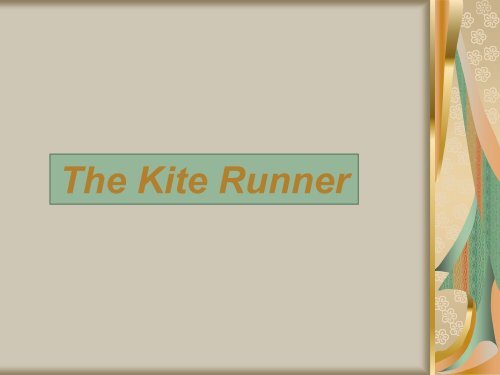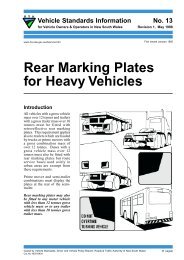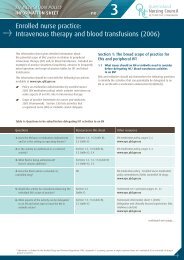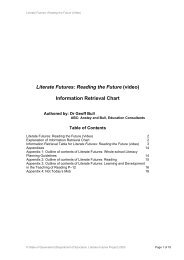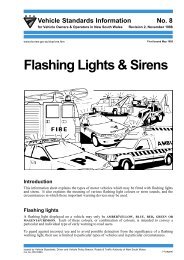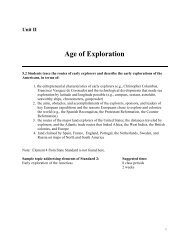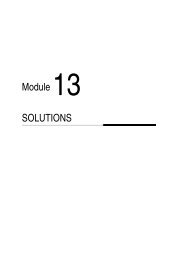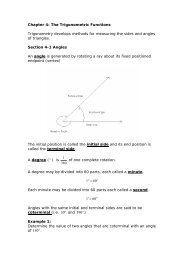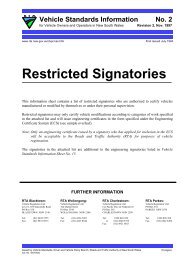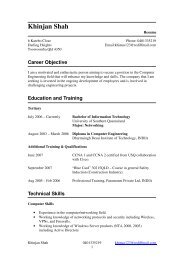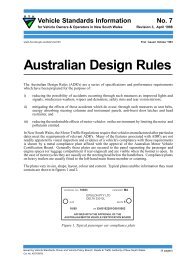The Kite Runner - Upload Student Web Pages
The Kite Runner - Upload Student Web Pages
The Kite Runner - Upload Student Web Pages
You also want an ePaper? Increase the reach of your titles
YUMPU automatically turns print PDFs into web optimized ePapers that Google loves.
<strong>The</strong> <strong>Kite</strong> <strong>Runner</strong>
Elements of the Story<br />
Protagonist – Amir<br />
<strong>The</strong> reader is not introduced to Amir until page 12 of the<br />
novel.<br />
This is his story that details his childhood in Afghanistan, the<br />
terrible betrayal, and eventually his return of his homeland<br />
to atone for the mistake of his youth.<br />
Antagonists –<br />
On the surface Assef seems to be the primary antagonist.<br />
He is a bigoted childhood acquaintance who is extremely<br />
violent and sadistic. Later he is a member of the Taliban.
Elements of Khaled Hosseini‘s Writing Style<br />
Hosseini uses accurate historical events, dates,<br />
and political figures.<br />
p. 5 ―. . .[a photo of] My grandfather and King Nadar Shah taken in<br />
1931 two years before the king‘s assassination . . .‖<br />
p. 9 ― . . . Ali and Hassan‘s characteristic Hazara Mongoloid<br />
features . . . Mongul descendants and that they looked a little<br />
like Chinese people.‖<br />
p. 9 ―. . . <strong>The</strong> Pashtuns had persecuted and oppressed the Hazaras<br />
. . . the Hazaras had tried to rise against the Pashtuns in the<br />
nineteenth century, but the Pashtuns had ‗queled them with<br />
unspeakable violence.‘‖
Hosseini includes Afghan words in his writing (he has these<br />
printed in italics) and then he immediately provides the English<br />
translation.<br />
p. 9 “Some had taken to calling him Babalu, or Boogeyman.‖<br />
p. 13 ―. . . Baba‘s famous nickname, Toophan agha, or ‗Mr.<br />
Hurricane.‘‖<br />
p. 15 ―‘I think I have saratan,‘ I said. Cancer.‖
You will notice as you read this novel that Hosseini also makes<br />
extensive use of foreshadowing.<br />
p. 25 ―Rahim Khan had been wrong about the mean streak<br />
thing.‖ (Amir does turn out to be mean spirited.)<br />
p. 37 ―Because suddenly Afghanistan changed forever.‖<br />
(This appears at the end of Chapter 4.)<br />
p. 41 ―Years later, I learned an English word for the creature<br />
that Assef was, a word for which a good Farsi equivalent<br />
does not exist: ‗sociopath.‘‖<br />
p. 288 ―I popped another one [a grape] in, unaware that it would<br />
be the last bit of solid food I would eat for a long time.‖
Also notice as you are reading that Hosseini makes extensive use of<br />
figurative writing devices such as similes, metaphors, alliterations,<br />
personifications, allusions.<br />
At the end of the novel we will also identify several symbols.<br />
Can you identify the following devices<br />
p. 9 ―‘Hey, Babalu, who did you eat today‘ they barked to a<br />
chorus of laughter.‖<br />
p. 13 ―My father was a force of nature . . .‖<br />
p. 18 ―‘But Mullah Fatiullah Khan seems nice,‘ I managed between<br />
bursts of tittering.<br />
‗So did Genghis Khan,‘ Baba said.‖
p. 28 ―Baba burst out in gales of his deep-throated laughter—a<br />
sound not unlike a truck engine revving up . . .‖<br />
p. 32 ―Words were secret doorways and I held all the keys.‖<br />
p. 34 ―Air grew heavy, damp, almost solid. I was breathing<br />
bricks.‖<br />
p. 45 ―. . . How can you talk with him, play with him, let him touch<br />
you‖ he said, his voice dripping with disgust.<br />
p. 55 ―<strong>The</strong> chase got pretty fierce; hordes of kite runners<br />
swarmed the streets, shoved past each other like those<br />
people from Spain I‘d read about once, the ones who run<br />
with the bulls.‖
p. 67 ―<strong>The</strong>y [the kites] fell from the sky like shooting stars with<br />
brilliant rippling tails, showering the neighborhoods below<br />
with prizes for the kite runners.‖<br />
p. 132 ―Baba loved the idea of America. It was living in America<br />
that gave him an ulcer.‖<br />
p. 144 ―<strong>The</strong> neighborhood‘s heads turned, the afternoon the bus<br />
sputtered up the street and farted its way across out the<br />
lot.‖<br />
p. 183 ―Through the open door, I could see lines of cars pulling<br />
in, sunlight winking in their windshields.‖
p. 256 ―He pointed to the crumbled, charred remains of the tiny<br />
village.‖<br />
p. 279 ―Wars were waged, the Internet was invented, and a robot<br />
had rolled on the surface of Mars, and in Afghanistan we<br />
were still telling Mullah Nasruddin jokes.‖
Another stylistic element that Khaled Hosseini uses is parallelism.<br />
Note some examples:<br />
p. 91 ―An hour later, I couldn‘t sleep. I kept tossing and turning<br />
as my relatives grunted, sighed, and snored.‖<br />
p. 103 ―For now, the lot was bare, save for dirt, stones and weeds.‖<br />
p. 130 ―After everything he‘d [Baba] built, planned, fought for,<br />
fretted over, dreamed of, this was the summation of his<br />
life: one disappointing son and two suitcases.‖<br />
p. 194 ―<strong>The</strong> idea of fatherhood unleashed a swirl of emotions in<br />
me. I found it frightening, invigorating, daunting, and<br />
exhilarating.‖
Can you indicate the parallelism in these quotations<br />
p. 198 ―Soraya had hers, the general had his, and I had<br />
this: that perhaps someone, somewhere,<br />
had decided to deny me fatherhood<br />
for the things I had done. Maybe this<br />
was my punishment, perhaps<br />
justly.‖<br />
p. 255 ―Baba had gotten himself shot by a singing, stoned Roussi<br />
officer—Baba made me so mad that night, so scared, and,<br />
ultimately, so proud.‖
Finally, you will notice as you read that Khaled Hosseini frequently<br />
incorporates sentence fragments at the end of an idea, primarily as<br />
an added thought.<br />
p. 54 ―If I changed my mind and asked for a bigger and fancier<br />
kite, Baba would buy it for me—but then he‘d buy it for<br />
Hassan too. Sometimes I wished he wouldn‘t do that.<br />
Wished he‘d let me be the favorite.‖<br />
p. 131 ―But before any of us could say or do anything, Kamal‘s<br />
father shoved the barrel in his mouth. I‘ll never forget the<br />
echo of that blast. Or the flash of light and the spray of<br />
blood.‖<br />
p. 141 ―A pair of steel hands closed around<br />
my windpipe at the sound of Hassan‘s<br />
name. I rolled down the window. Waited<br />
for the steel hands to loosen their grip.‖
What some reviews have said about <strong>The</strong> <strong>Kite</strong> <strong>Runner</strong><br />
―. . . tragic, filled with despair, and very sad; at other<br />
times, it is uplifting and hopeful …‖<br />
―. .. exploring the culture of a previously obscure<br />
nation (Afghanistan) . . .‖<br />
― . . . I was completely riveted, horrified and moved so much<br />
I had to put it down and sob at least twice.‖


